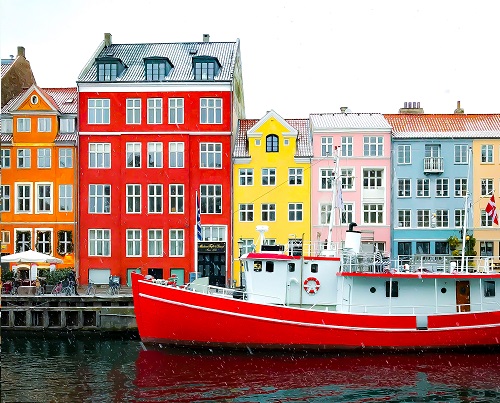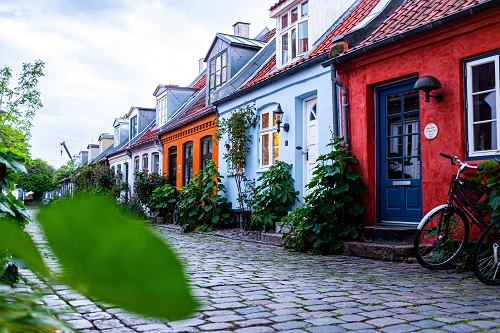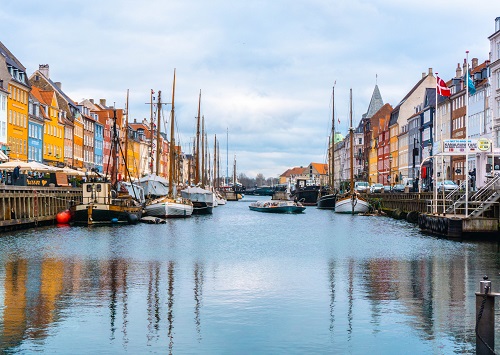Known for its bicycle culture, its butter cookies and its invention of lego, back in 1932, Denmark is a popular destination with both tourists and expats. If you’re looking to buy or rent property there, then read on to learn more about your options.First of all, you’ll need to prepare yourself for real estate in Denmark, because it can be competitive and difficult to navigate, especially in major cities. For example, in Århus and Copenhagen, you’ll find elevated real estate prices and high demand. This can make it difficult to find properties that suit mid to low budgets.
But outside of these major cities, your options open up. Which is why it’s important to think about what you’re really looking for in a property, before you begin your search. For example, are you looking to be in a city centre? Are you looking for a spacious property for your family? Or do you not mind where you live, as long as it’s within budget?
Determining which factors are important, and which factors you’re willing to compromise on, will help you to narrow down your options, so that you’re ready if your dream property comes along.
Finding property in Denmark
If you’re looking for a large, expensive apartment in Denmark, you’ll have plenty of options to choose from. However, if your budget is smaller, you may find that you have limited choices. That’s not to say you won’t be able to find a property though.
As real estate moves so quickly, you will want to make sure that you hear of new properties as soon as they become available. In addition to browsing estate agent listings, you could join Facebook groups, forums and other chat services, to help keep you in the loop.
There are also websites that you may find useful, such as:
• Boligsiden
• Bolig Portal
• City Apartment
• Housing Denmark
• Nestpick
Renting property in Denmark
The rental market in Denmark is split into two categories: the private housing sector, and the public housing sector.
The public housing sector is non-profit and more regulated. As a result, rent tends to be cheaper. However, if you’re planning to move to one of the main cities, you may find it difficult to use this sector, unless you’ll be living in Denmark for five or more years, as the waiting lists are so long.

The private sector is regularly building new homes in Denmark, especially apartments in major cities. As a result, it tends to offer more rental opportunities. To give you an example of how the property prices vary in the private rental sector, here’s how much you can expect rent to cost for a two-bedroom property in the following locations:
Copenhagen
Apartment: 13,000 DKK (£1,526) per month.
House: 20,000 DKK (£2,348) per month.
Aarhus
Apartment: 8,000 DKK (£939) per month.
House: 12,000 DKK (£1400) per month.
Odense
Apartment: 6,000 DKK (£700) per month.
House: 8,000 DKK (£939) per month.
Aalborg
Apartment: 6,000 DKK (£700) per month.
House: 9,000 DKK (£1,050) per month.
Esbjerg
Apartment: 5,000 DKK (£590) per month.
House: 7,000 DKK (£820) per month.
Horsens
Apartment: 5,000 DKK (£590) per month.
House: 9,000 DKK (£1,050) per month.
Kolding
Apartment: 6,500 DKK (£760) per month.
House: 8,000 DKK (£939) per month.
Once you have found a property you like, it’s time to secure the paperwork. Tenancies in Denmark typically last for a minimum of a year, and require the equivalent of one to three months’ rent as a deposit. However, the exact details will be confirmed in your rental contract.
At the beginning and end of your tenancy, there are mandatory reports that you must fill in. Examples of these include the indflytningsrapport and fraflytningsrapport, which are essentially your ‘moving in’ and ‘moving out’ reports.
It’s important to know that landlords are supposed to inspect the property two weeks prior to the start of a new tenant’s lease. If they fail to do this, they cannot hold onto your deposit at the end of your tenancy, regardless of the condition the property is in. Nonetheless, it’s always best to take photos of your property at the start of your tenancy, so that you have proof, should you ever need it.
Purchasing property in Denmark
One of the quickest ways to bypass the competitive nature of the rental market in Denmark is to buy your own property. As foreign nationals have exactly the same rights as Danes when it comes to taking out a mortgage, Denmark’s banks and/or credit institutions are your best bet if you need financial assistance. In many cases, they only require a 5% to 10% deposit.
However, there are some limitations that may prohibit you from acquiring property in Denmark. For example, you may find it difficult to purchase a property if you haven’t resided in Denmark for five years, or if you are not an EU national. In saying this, if you have a valid residence or business permit, these factors shouldn’t cause a problem.
If you’re not an EU/EEA citizen, then you’ll need to acquire permission from the Danish Ministry of Justice in order to purchase a property. This will be handled by your lawyer. It’s important to know that if you purchase a property without living in Denmark for five years and then want to sell it, you are obliged to do so within six months. This is waived if you live in the property for more than five years, or if you have resided in Denmark, through renting, prior to your property purchase.
There are two types of property you can buy in Denmark, Ejers and Andels.
Ejers means that you are the owner of the house/apartment and can make changes to the property (unless it’s to the apartment, then you can’t change the facade etc.). Whereas Andels is where you’re not the full owner of the property, and are instead considered a “shareholder” in the building. With Andels, decisions are made by all the shareholders, so there are more rules and regulations regarding making changes and renting out.

Regardless of which type you choose, once you have found a property you like and have made an offer, it’s time for the paperwork process to begin!
Once your offer has been made/accepted, the seller’s estate agent will draw up the purchase agreement. It’s at this stage that the transfer deed should be made, which is paid for equally by the buyer and seller and provides both parties with insurance.
Once the purchase agreement has been signed, the buyer will place a deposit of 5% to 10% of the property price, which will be held by their estate agent. After this, there will be a six-day grace period, where the buyer can withdraw from the sale if they want to. However, they may face a fee of 1% of the property price for doing so. If you decide to go ahead with the purchase, and so long as everything’s okay with your finances, the process will move ahead and the property will soon be yours.
The closing date will be agreed upon by both estate agents, and will be confirmed when the funds have been transferred and the property deeds signed. However, before this happens, it’s important to ensure that all appropriate checks have been done, such as for damp and building construction errors.
The seller should provide a property report that outlines the physical condition of the property. This report should include whether there are any noticeable defects or conditions that may go on to cause problems. Whilst this report is not a requirement, it must be done if you want a transfer deed. It will protect you in the long run too, as, if it’s not done, the seller can be held responsible for defects and damages for up to 20 years.
Once your checks have been done and a contract has been finalised, the deed of conveyance (Skøde) will be drawn up by your attorney. The solicitor/lawyer will then notarise the documents on your behalf and issue the official owner document.
It’s important to ensure that all paperwork is up to date during this process, as you will require the following:
• Property tax note
• Land certificate
• Operating permit
• BBR-owner information
• Energy rating and energy plan
• Buildings and fire insurance
If there’s anything you’re not sure on, your solicitor will be able to advise you.
It’s important to be aware that you may have to pay some fees when you buy a property in Denmark. Examples of these fees include:
• Final contract fees: 0.6% of the property price + €175.
• Lawyers’ fees: variable
• Legal fees: 1.5% of the mortgage value + €175
• Stamp duty: 0.6% to 1.5% of the property value
• Estate agent fees: 5% to 6% of the property value

